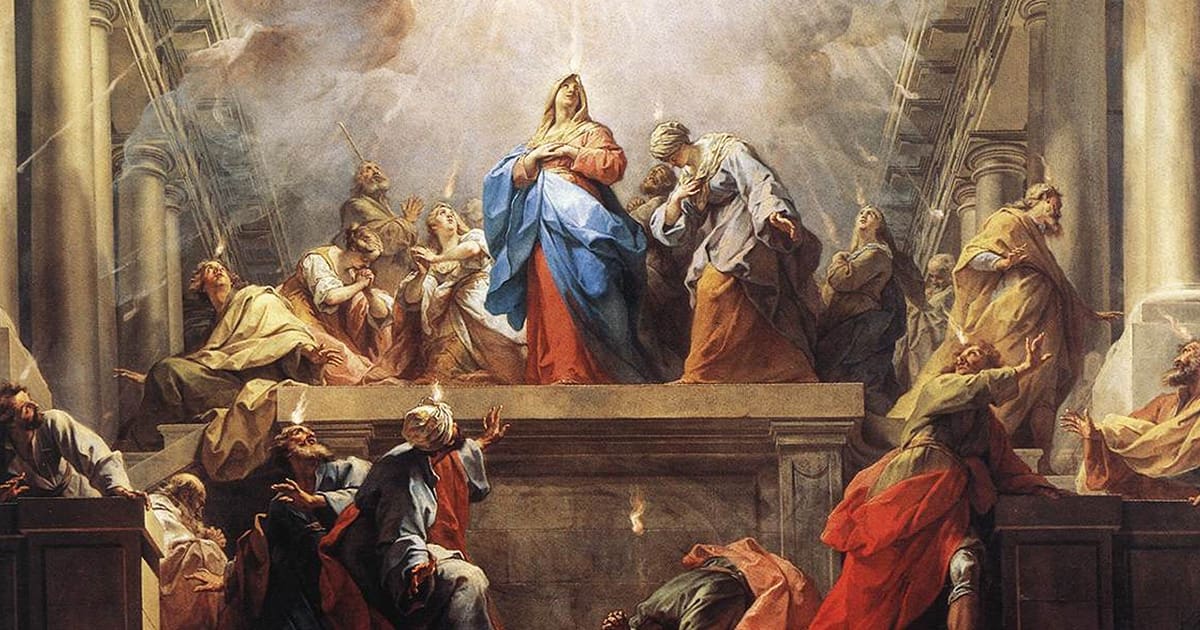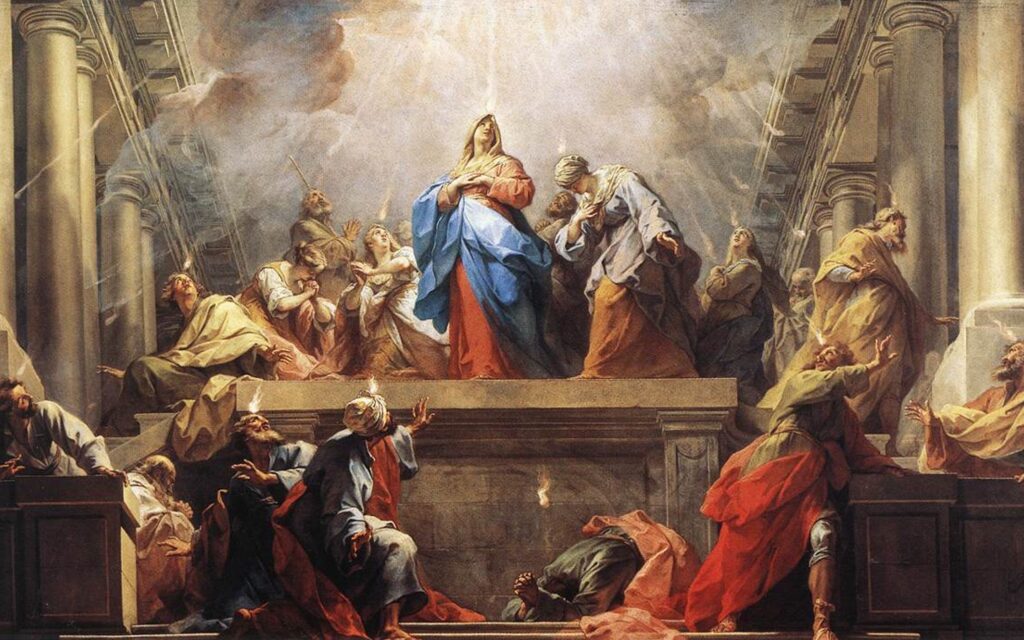On the Winds of Pentecost with Saint Elizabeth Ann Seton
At Pentecost, we celebrate the descent of the Holy Spirit and the birth of the Church through imagery of divine wind and fire. For Mother Seton—and for Catholics today—it’s within the storms and wreckage of life that grace is encountered, and new paths are revealed.
“When the time for Pentecost was fulfilled, they were all in one place together. And suddenly there came from the sky a noise like a strong driving wind, and it filled the entire house in which they were. Then there appeared to them tongues as of fire, which parted and came to rest on each one of them.” (Acts 2:1-3)
When I was a teenager exploring scripture on my own for the first time, I was struck by this description of the Holy Spirit arriving at Pentecost and giving birth to the Church. It all seemed like a wild, chaotic and terrifying process — the terrible roar of a driving wind!
Anyone who has ever lived through a hurricane, or especially a tornado, can tell you that the noise and violence can feel heart-stopping, like a train hurtling towards you, full of power — the power to uproot, throw things about; the power to upend; the power to disorient; the power to ruin everything, seemingly forever.
Living as I did in a dysfunctional, sometimes violent and abusive, often just plain crazy household, I took some comfort in the description of an unknowable, seemingly catastrophic event that is in fact a catalyst for something creative arising after it.
It seemed, actually, a very hopeful thing to me that said, “Hang in there, everything is happening for a purpose, so just keep on, keep believing.”
And that message has been proven true in my life.
How often I have looked back on events that seemed terrible — were terrible — and found myself saying, “Yes, it was terrible, but had that not occurred, I’d never understand this thing before me, now.” Or I’d have never had an important insight that helped another, or I’d simply never be the person I have become, for better or worse.
My friendship with St. Philip Neri was cemented the day I read from his maxims, “All of God’s purposes are to the good; although we may not always understand this we can trust in it.”
The words, I knew, were true, and we had the example of Christ’s own Passion, which brought us the hope of redemption and eternal life, and the coming of the Holy Spirit at Pentecost, to prove it.
We also have the example of St. Elizabeth Ann Seton to not only prove the maxim, but to show us what we are meant to do with the sometimes baffling, often heart-breaking tumult that can often accompany the way the Holy Spirit arrives into our lives, and throws all of our comforts to the wind. At these times, we are left only with Grace, and our willingness to be open to what has happened—to not only “hang in there” in some passive manner, while waiting for rescue, but to actively see what avenues the debris has closed off, what paths it has opened, and then head down some new path in trust.
The trust is a necessary component of both enduring and working with the challenges that the Holy Spirit brings into our lives.
For Elizabeth Bayley Seton, the comfortable daughter of a respected doctor, the beloved wife of a notable businessman, well-connected, fashionable and socially popular, trust was essential to her story.
For all of her social status, Elizabeth had been no flibbertigibbet serving her own pleasures; her life as a young matron had been a socially conscious one in which she advocated for the sick, the poor, the widowed. She was, by all accounts, what we would today call a “good person” and a spiritually generous one.
And yet, into her peaceful and set existence came the sort of chaos that always makes us wonder, “Why is this being permitted to happen to this person?”
It must have felt like a destructive wind was ripping through Elizabeth’s life when her husband William Magee Seton became so ill with tuberculosis that the couple and their eldest daughter were displaced to Italy for the sake of his health. Upon his death she, who had been a charter member and officer of The Society for the Relief of Poor Widows with Small Children became herself a widow with small children. When she returned to New York, with five children to care for, and became a Catholic, she became poor as well, rejected by the society she had previously both enjoyed and served. It must have seemed a cruel irony — it would have to most of us.
And yet Elizabeth had always enjoyed a lifelong devotion to scripture reading. She had to have been very familiar with the depiction of the Holy Spirit’s arrival at Pentecost, in all of its terrifying noise and whirlwinds, and as her life was cast to bits, avenues closed off, she had the wisdom to seek out the new paths uncovered, and to trust, and to follow where the Holy Spirit was leading.
In doing so, Mother Seton ended up founding a religious congregation of women dedicated to the furtherance of educational opportunities for Catholics in America — her Sisters more or less launched the Catholic educational system — and the care of the poor, and the orphaned, and their work continues to this day.
“Elizabeth Seton did more for the Church in America than all of us bishops together,” said Archbishop Francis Patrick Kenrick, thirty years after her death, and it all began with the descent of the Holy Spirit coming into her life and “ruining” it, and her willingness to co-operate with Grace, when Grace was all that was left to her.
All of this is a heartening example for Catholics, who are currently living through a spectacularly destructive whirlwind that has upended what used to feel like a comfortable Church. We may look at the sins before us and think, “Where is the Holy Spirit in all of this? What possible good can come from the strewing about of our trust, our hope?”
But it’s rather like my reading of Pentecost while my stormy family raged and flailed; amid all of the destruction, amid all of the wreckage, new paths will be revealed, and we will always be given the Grace we need. We will only have to prayerfully discern how to co-operate with that Grace to help bring about the purposes of the living God, which ride on the wind of the Holy Spirit.
By the example of how she lived her life, how she co-operated with Grace, we see that Elizabeth Ann Seton knew all of this. And she knew, to paraphrase Flannery O’ Connor, faith was not a warm blanket, but a cross.
In a letter to a friend, Mother Seton wrote, perhaps most appropriately for this upcoming Pentecost:
“All he asks of us is our good will. We are never strong enough to bear our cross — it is the cross that carries us — nor so weak as to be unable to bear it, since the weakest become strong by its virtue… It is God alone we must look at in all that befalls us, small or great, and be persuaded that men and devils combined can do nothing ever so small but what He permits, and He permits no pain or trial to befall us but for the exercise of our virtue and His glory.”
A mighty wind is upon us, in our Church and it comes into every life, too, truth be told. Let us learn how best to co-operate with the Grace that may be all that is left in its wake.
ELIZABETH SCALIA is the award-winning author of Strange Gods, Unmasking the Idols in Everyday Life and Little Sins Mean a Lot: Kicking Our Bad Habits Before They Kick You.
Source: https://setonshrine.org/
Tags:








0 Comments